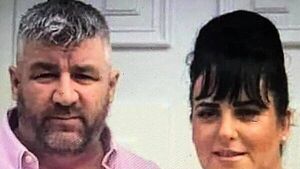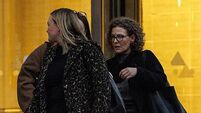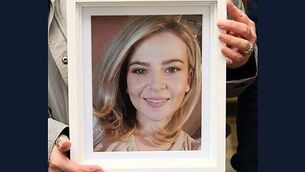Daniel Dooley appeals conviction for 'honour killing' at Kerry funeral

Fiona Magennis
One of six family members jailed for the murder of Thomas 'Tom' Dooley in an 'honour killing' during a funeral in Co Kerry has appealed his conviction, claiming his identification by the victim’s widow in court was unfair and prejudicial and should have resulted in the case being withdrawn from the jury.
Daniel Dooley (44) of An Carraigin, Connolly Park, Tralee, Co Kerry had pleaded not guilty to murdering Thomas Dooley at Rath Cemetery, Rathass, Tralee, Co Kerry on October 5, 2022 but was convicted by a majority jury verdict in July 2024.
His legal team told the Court of Appeal on Tuesday that Siobhan Dooley had initially identified someone else but whilst giving evidence in court she indicated that Daniel Dooley had been one of her husband’s attackers. Mrs Dooley said she got confused by the faces because the two men were “an awful lot alike”.
They argued that the dock identification fundamentally altered the nature of the case the defence had to answer, resulting in undue prejudice against the appellant.
Daniel Dooley was one of six defendants – including a teenage boy – who were found guilty of murder by a jury who deliberated for nearly 21 hours over five days at the Central Criminal Court in Cork.
It was the prosecution case that Mr Dooley died when he was violently attacked by six men as he attended a funeral at Rath Cemetery and suffered what the State described as savage injuries, inflicted by a group armed with bladed weapons and acting with "focused and murderous ferocity" in broad daylight.
In his closing speech, Dean Kelly SC, prosecuting, submitted to the jury that the six men had used "medieval violence" to "butcher" the father-of-seven in "an honour killing" during the funeral, carrying out a "biblical atrocity" that was "tragic and heartbreaking as it was ridiculous and stupid".
Launching an appeal against Daniel Dooley’s conviction, Dominic McGinn SC, representing Daniel Dooley, said his core argument was that the case should have been withdrawn from the jury at the close of the prosecution case as a result of unfairness.
Mr McGinn said the evidence against Daniel Dooley was “significantly different” to the evidence against the other accused at the time. He said the appellant came to be charged “late in the day” and there was very limited time between him being charged and the trial itself.
He said the only evidence that existed against Daniel Dooley was a segment of CCTV that showed him leaving his house, entering a van carrying an implement which was “long and stick like”. He said there was no evidence any such implement was used on the deceased.
“After the incident, he left the scene with a number of others who were accused of violence, so it really was his association,” said counsel.
Mr McGinn said that changed when the deceased’s wife, Siobhan Dooley had named Daniel Dooley during the course of her evidence.
He said she indicated “in direct terms” that Daniel Dooley had been one of those that attacked her husband.
She had initially identified a different person, he said, but during the course of the investigation it was established that this man was in a different location at the time and could not have been at the graveyard.
He said in her direct evidence, Siobhan Dooley said she got confused by the faces because the two men were “an awful lot alike”.
Mr McGinn said that had never been part of the prosecution case up to that point and “brought into focus” the credibility and reliability of Siobhan Dooley.
He also highlighted a letter signed by Siobhan Dooley which was sent to the Director of Public Prosecutions asking that she reconsider her decision not to prosecute Daniel Dooley.
Because Siobhan Dooley’s evidence then became “so crucial” that aspect added to “the unfairness”, the barrister said.
Mr McGinn also argued there was failure by the trial judge to discharge the jury on the application of counsel in spite of a clear lack of evidence and that the judge had failed to correctly charge the jury in relation to the identification warning given; Siobhan Dooley’s credibility; inferences that could be drawn and the legal components of joint enterprise – the legal principle which allowed all six men to be charged with murder.
“Our concern is, although there is some degree of evidence there, it is tenuous and in our submission the risk - because Daniel Dooley was one of a number of accused all being lumped in together as it were - the risk was the jury would simply make an assumption that it doesn’t matter about the strength or quality of the evidence, that they were all in it together,” said Mr McGinn.
In response Dean Kelly, for the DPP, said the decision to charge Daniel Dooley came about eight or ten weeks before the trial and no application was ever made that he not be tried with his co-accused.
He acknowledged that Siobhan Dooley’s evidence was “unexpected” but said it was properly handled by the trial judge, who allowed the defence extra time to prepare for cross-examination.
In relation to the evidence against Daniel Dooley, Mr Kelly said CCTV showed Mr Dooley getting into a van driven by his cousin, Patrick Dooley, that morning carrying a “long, rigid” implement.
Dooley claimed it was a walking stick, though this was something he was clearly “not in need of”, having been seen running to and from the van, counsel said.
All six of the accused men were seen running to three vehicles within seconds of the fatal attack having taken place and Daniel Dooley and Patrick Dooley were subsequently “picked up on CCTV” at a service station in Bothar Bui about halfway to Cork before Daniel Dooley was dropped off near his mother’s house.
Mr Kelly also highlighted Daniel Dooley’s failure to answer questions put to him by gardaí about his presence at the cemetery and at the service station.
He said the suggestion that the evidence brought was “light” did not stand up to analysis.
Mr Justice John Edwards said the court would reserve judgement in the case.
The six men convicted of murder were younger brother of the late Mr Dooley, Patrick Dooley (36) with an address at Arbutus Grove, Killarney, Mr Dooley’s cousin and brother-in-law Thomas Dooley Senior (43) and that man’s son, Thomas Dooley Junior (21), along with the victim's cousins Michael Dooley (29), all of the Halting Site, Carrigrohane Road, Cork and Daniel Dooley (42) of An Carraigin, Connolly Park, Tralee, Co Kerry, as well as a male teenager.
They had all pleaded not guilty to murdering Thomas Dooley at Rath Cemetery, Rathass, Tralee, Co Kerry on October 5th, 2022.
Ms Justice Mary Ellen Ring sentenced five of the defendants to life in prison on July 30th, 2024. A 19-year-old man was sentenced to 11 years in jail - with the final three years suspended – in March this year.
Passing sentence on the five men, Ms Justice Ring said there had been protestations of innocence and miscarriages of justice made by the defendants in court.
"Let's be clear, the only innocents were the late Thomas Dooley, his wife and their children. The only miscarriage of justice was the talking of his life and the loss to his family," she stressed.
The judge said no explanation for the decision to kill Thomas Dooley had ever been proffered. "No explanation could excuse his death. The violence in this case was totally unwarranted and unspeakable," she said.





